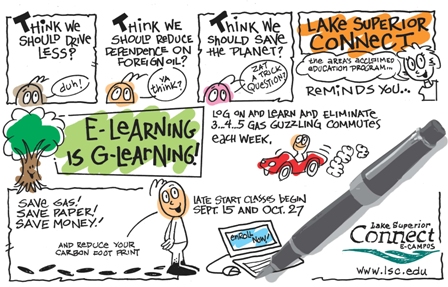
Is e-learning part of your college's sustainability plan? It probably should be. As the study I've referenced below indicates, another unexpected benefit of online courses is less impact on the environment. In a brilliant marketing campaign, Lake Superior College in Duluth is using print ads (above) and YouTube (below) to promote their online courses and programs.
Is Online Learning Better for the Planet?:
As a way of reducing greenhouse gas emissions, online learning may be one of the most unexploited means of achieving a smaller carbon footprint. Though few traditional colleges and universities in the U.S. have yet to track this as part of their climate reduction strategies, research now indicates that it may have potential for cutting carbon emissions on several fronts.
A joint study entitled Towards Sustainable Higher Education: Environmental impacts of campus-based and distance higher education systems conducted in 2007 by the Stockholm Environmental Institute (SEI) and the United Kingdom's Open University Design Innovation Group (DIG) identified new educational models, such as e-learning and distance education, as significantly less carbon-intensive as conventional classroom-based coursework.
Examining 13 campus-based and seven print-based and online distance learning courses (20 total), the study compared potential sources of carbon emissions including paper consumption, computing, travel, accommodations, and campus site impacts, with the latter three having the largest impact. Results were normalized in terms of energy consumption and carbon dioxide emissions per student.
Offering more intensive utilization of campus facilities, online learning provided impressive carbon dioxide savings over conventional classroom education. Economies of scale give online education the edge by spreading campus impacts over a larger number of students, reducing campus site CO2 emissions from 81 kg (178.5 lbs) for a full time to student to about 2 kg (4.4 lbs) for a blended online and print-based course.
Not surprisingly, travel was also a significant source of greenhouse gas emissions, resulting from term-time travel to and from campus, as well as travel between 'home' and term-time residence. Distance learning courses (including online education) resulted in an 89 percent reduction in travel-related emissions over full-time onsite courses.
Residential energy consumption was also considered in the study, with the assumption that if a full time student had a term-time residence separate from 'home,' it resulted in a duplication of dwellings, heating energy for which was included. On average, residential energy for full-time students in regular classrooms came to 102 kg (225 lbs) versus 4.4 kg (9.7 lbs) for primarily online students.
And while many have expressed concern that the ensuing increase in computing for online education could negate any energy savings because of the incredible amounts of electricity used to run server farms, this did not prove true. Certainly, the largest environmental impact of online education was computing, adding 24 kg (53 lbs) of CO2 to the atmosphere per student (as a side note, paper use showed little change when comparing online to onsite students). Yet the study concluded that the 90 percent savings in energy and emissions in the areas of transport, campus site, and residential energy far outweighed this downside.
The popularity of e-learning platforms in the U.S. has been rising steadily in recent years, with more than 3.9 million students taking at least one online course during fall 2007 -- up 12 percent over 2006. 'Higher education is growing at about 1.5 percent annually, while e-learning is increasing at about 9-10 percent,' according to Ray Schroeder in the Office of Technology-Enhanced Learning at University of Illinois (Springfield). Yet most institutions have not yet added e-learning initiatives to their sustainability plans.
1 comment:
Ya I agree that elearning is the good method to make people go behind the topic throuh searching and sharing thoughts with others too..
Nice Post.. Good work
Thanks
Rone from english courses in the uk
Post a Comment